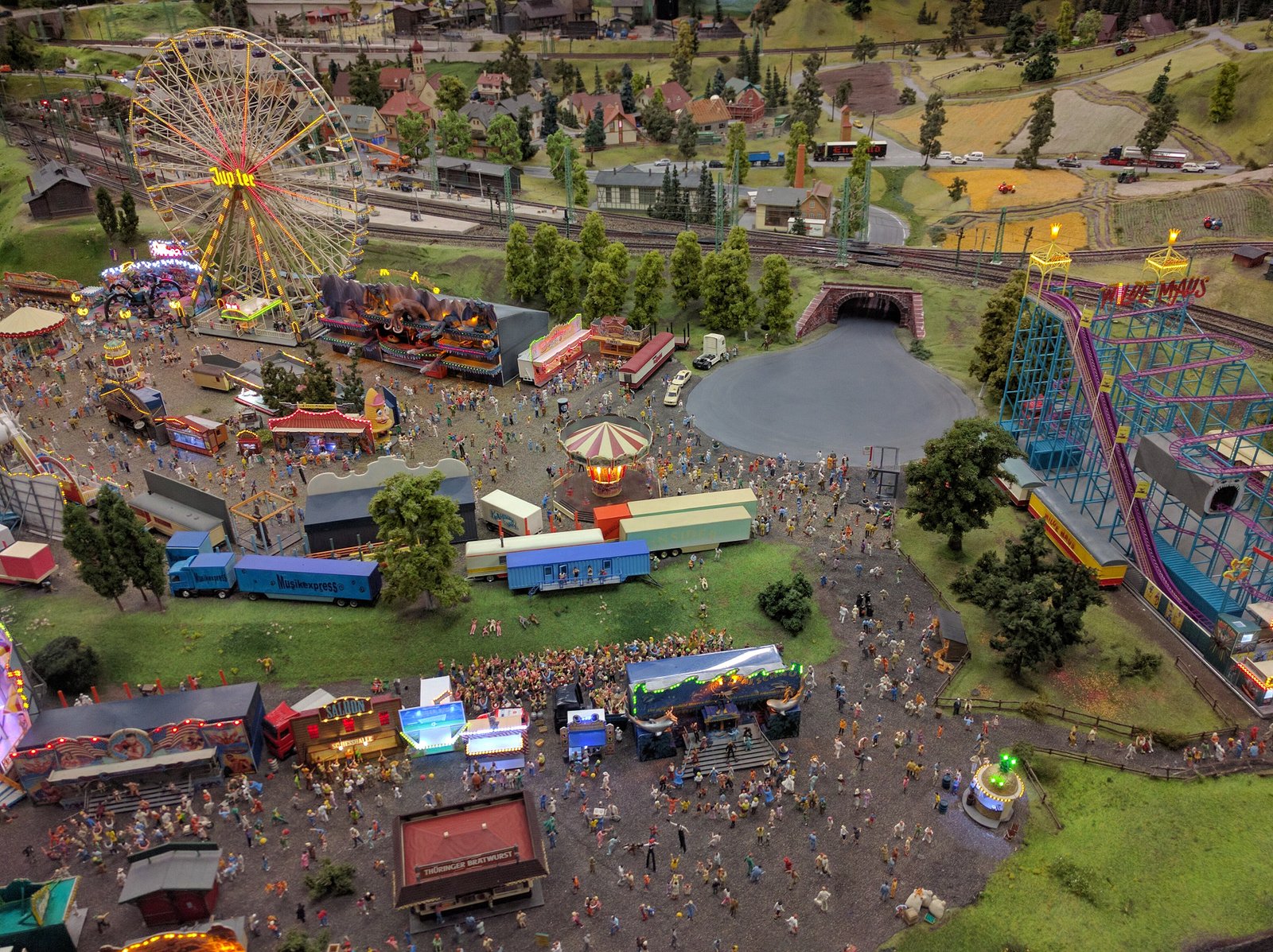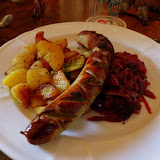May 14, 2016: Hamburg (Kiel), Germany
After a nice, relaxing (and overdue) day at sea, we arrived into the port of Kiel, on Germany’s north coast. Today is another DIY day with a train trip on Deutche Bahn to Hamburg and visiting the Miniataur Wunderland museum. With an on time 8am arrival to our dock, we had an extra 30 minutes before we left the ship, taking a leisurely walk along the waterfront to the Kiel Hauptbahnhof (Central Train Station). It was about 20-25 minutes from the port to the train station, giving us about 15-20 minutes to purchase our tickets.
See all 153 pictures from our 2016 Baltic Cruise in the Photo Galleries
As it was a Saturday, and our trip was to Hamburg (about 75 minutes away), we were able to take advantage of a Regional Ticket special called the Schleswig-Holstein ticket. First person pays 24.50 Euro for an all day ticket, valid on any train journeys in the region, and each additional person pays 4 Euros each. So, with the credit card processing fee (50 cents), grand total for our round trip train tickets was 37 Euros vs. regular price of 98 Euros. A great travel value if you are travelling with a group (or if you make friends along the way!) This special ticket is currently valid Mon-Fri after 9am and all day on the weekends.
Our RE70 9:21am departure pulled out right on time and we settled into a 2×2 set of seats facing one another for the hour and a quarter ride into Hamburg. We had a few short stops along the way, but the trip was quiet, enjoyable, and kept us out of the off and on rain that was threatening all day.
Arriving into Hamburg, we made our way through the massive train station (one of the largest of our trip thus far), and out to the bus stops to pick up a #6 to take us to the museum. Unfortunately, due to some nearby construction, the stop we were waiting at had no buses! After a short delay, and figuring out the alternate location to pick up the bus, we were back onboard (1.50 Euro per person) and 9 stops later, we arrived at a tall set of brick warehouses along the Hamburg canals. The rain was coming down at this point, so we made a quick 2 minute dash across the street and entered the building for the Minitaur Wunderland museum.
Located on floors 2, 3, and 4 of this massive warehouse building (they are growing and expanding even more between now and 2020 to additional floors and sections of the current building), the Minitaur Wunderland is a place where kids (and kids of all ages) convene to see dozens of amazing exhibits showing cities, regions, attractions, and global destinations, painstaking reproduced entirely in miniature. Think model trains, but on a massively larger scale. These buildouts can take months and years to complete with miles and miles of wiring, computer programs running lights, elements of movement (cars, vehicles, people, action/activities) and much, much more (details later!).
Our first exhibit was a set of dioramas showing the history of Germany (specifically the intersection of East and West Berlin) through the course of 6000 years. Each scene was created with no less than 7 layers of base material, insulation, wiring, plaster, paint, landscaping/road cover, buildings, people, vehicles, etc.
From here, we “travelled” to Italy, where we saw a new exhibit under build showing several cities, towns, and lakes of the country, again, entirely in miniature. The room was massive, and you could see the build in progress, as various components are coming together for the final release of this exhibit later in 2016. The initial design began in 2013, and the facts and figures that go into each of these exhibits is staggering. 100,000 hours of individual build time and creation… Miles of wiring for the lights for each streetlamp, car, light bulb in a home, etc… Underneath each display, and sometimes in side displays, a sample of the dozens of computer systems that control and power a single exhibit are visible. What’s even more amazing is that each exhibit is responsive and reacts to an actual day/night cycle! Every 5-10 minutes, the “sky” in each area would move from dawn to midday to afternoon to night, and the displays would respond with cars turning on their headlights, bars and taverns lighting up and opening their doors, construction and road work starting in the morning hours and stopping at the end of the “day”, kids playing at the park during the day, but an outdoor concert venue firing off fireworks and the band starting to pay at sundown. The complexities of these setups is mind boggling.
As we moved into the next room, we visited our first fully complete cityscape, based in the Alps, with a small town and its central train station taking on the daily business of life. Trucks moved, lights flickered from cars, homes, and buildings. Cranes were moving supplies, trains were flying by moving through the city, passing through tunnels, etc.
As we continued through the displays, each contained a set of buttons, and given that the signs were in German, we never really knew what the button would do. R pressed a button and would then search the cityscape looking for the new movement, motion, or special “easter egg” that this button provided. Sometimes, it was a campfire lighting up for a set of campers at the nearby river… Other times, it was a crane taking an air conditioner unit from a parking lot to the roof of a nearby building. Later on in the cityscape, the magic button made the carnival rides spin around with scores of people riding along, and in another, there was a tic-tac-toe game in the grass, where you could play against a computer! One of them was a Lindy chocolate factory that not only showed the chocolate being made (in miniature, of course!), there was a golden chute with real chocolate candies that dropped down for us visitors to enjoy! (Natalie and Edie both got one and said that it was pretty good chocolate, though the sample was a little small – pun intended… J)
As we worked through the massive 3rd floor of the building, we passed through approx. 6-7 cityscapes, with everything from high rise buildings to a woodstock like outdoor concert venue with music videos, a band playing, and the crowd holding up hundreds of lighters!
Finally, we made our way up to the 4th floor where almost half the floor presented the current exhibition. It was a fully functioning airport! Planes were at the gates, baggage cars, service vehicles were driving all over the place, and then the planes started moving! Based on the overhead screens, showing the planes, their respective flight times, etc. the planes would pull away from their gates and glide across the secondary runways to queue up to take off! There was a main runway and traffic both “took off” and “landed” from here in a very realistic way with underbelly supports and some fun effects.
The place was absolutely packed, with wait times to enter the museum from 25-90 minutes throughout the morning. On the train down from Kiel, I went online and made a free timed ticket reservation that allowed us to enter between 12-1pm (60 minute window) without delay, saving us hours of delay, given that when we arrived a few minutes before 12, they were selling entry tickets for 3:15pm!
We spent about 2 hours at the museum, and while we could have easily spent all day there, we had a great introduction and didn’t feel that we “missed” anything critical. On the way out, we were able to pass by the control room, where the master builders and designers were monitoring all of the activity and action of the museum in real time through all of the computers and systems, ensuring that they were working properly. What a great career!
Back to the bus for a 15 minute trip back to central station in Hamburg and with a few minutes to spare, we were on the 2:21pm train back to Kiel, arriving at 3:40pm. With the nice 20 minute walk back to the ship, we arrived right at 4pm, giving some time before dinner. The Miniatur Wunderland was enjoyed by everyone in the group and a great day of exploration and fun for R!
See all 153 pictures from our 2016 Baltic Cruise in the Photo Galleries





Leave a reply